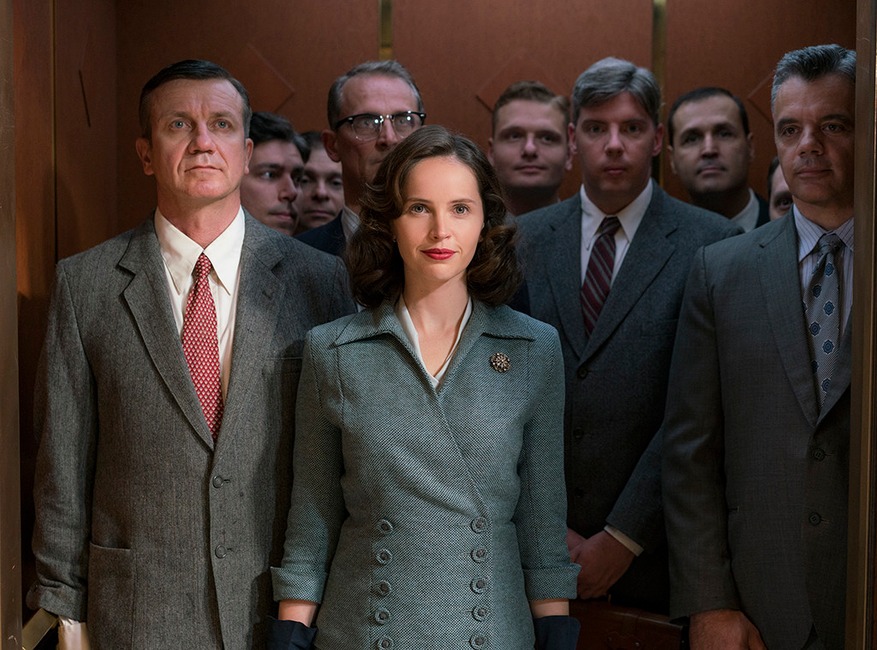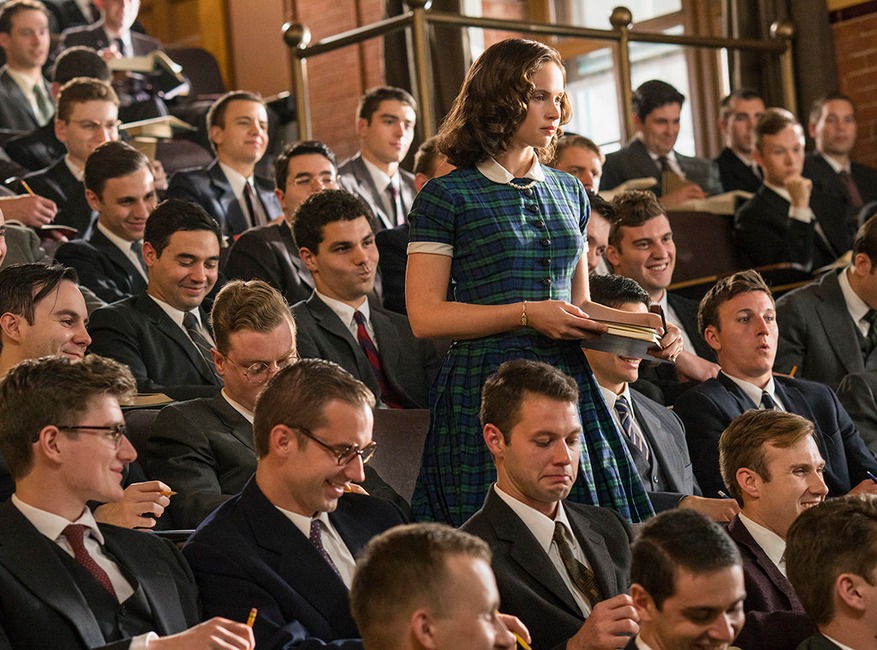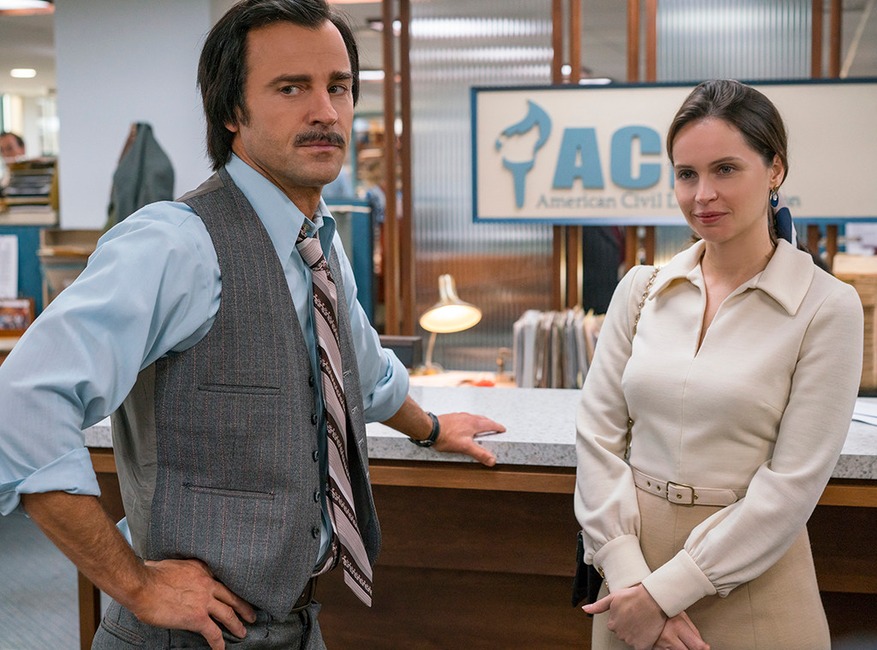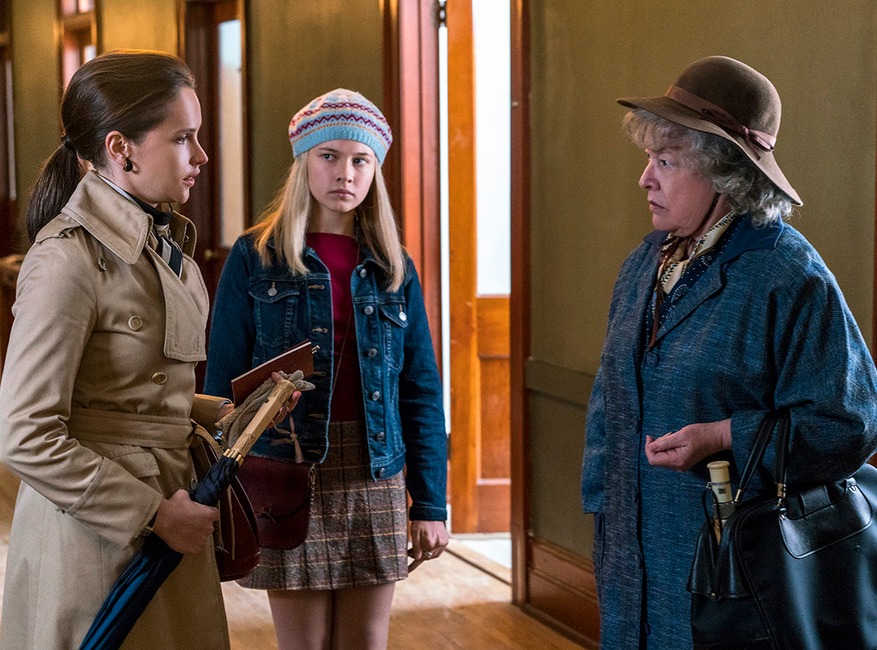
Nikki Kahn/The Washington Post via Getty Images
On the Basis of Sex goes to great lengths to get Ruth Bader Ginsburg‘s story right.
And it makes sense, considering the film, which chronicles the beloved Supreme Court Justice’s life and career from her first year at Harvard Law School to her first gender discrimination case tried before the 10th Circuit Court of Appeals and, starring Felicity Jones as the RBG alongside Armie Hammer as her beloved husband Marty, was released on Christmas Day, was written with painstaking care by her very own nephew Daniel Stiepelman. And the novice screenwriter, who went to film school but had never written a professional script prior to taking on the daunting task of penning the life story of a judicial superhero and recent pop culture icon—no big deal—had the greatest resource of all: Ginsburg herself.
While writing the script, he made several trips to Washington, D.C., where he had full access to his aunt’s files at the Library of Congress. “Then, by night, we would sit together and have dinner and usually polish off a bottle of wine,” he told The New Yorker in December. Aside from having her files at his disposal, Stiepelman could also rely on Ginsburg and her judicious mind for notes on his drafts.
“I’d call her up, and she’d be, like, ‘Oh, Daniel, I’m in the middle of reading the Affordable Care Act. Can you call me back in twenty minutes?’ And then she’d be, like, ‘O.K., page 1,’ and she’d go through it like a contract,” he told the publication. “‘Here you have me wearing high heels at Harvard, but in those days I used to walk to school, so I wouldn’t wear high heels.'” (She personally edited the first three drafts before turning the responsibility over to her daughter Jane.)
But even with all that access and attention to detail, the very nature of crafting a film narrative all but requires that you take some liberties in the pursuit of time and drama. And Ginsburg is the first to admit that happened here. “This film is part-fact, part-imaginative, but what’s wonderful about it is that the imaginative parts fit in with the story so well,” she told the crowd during a post-screening interview with NPR’s Nina Totenberg in New York City earlier this month.
So, what was fact and what’s fiction? We’re glad you asked. While several moments that seem to be the sort of thing that can only happen in Hollywood fantasy—Ginsburg attending both her and Marty’s Harvard Law classes at the same time to keep make sure he didn’t fall behind in his studies while he battled testicular cancer, for example—are indeed the truth and nothing but the truth, the “part-imaginative” parts are worth nothing. After all, the more you know…
So, in the interest of helping make you look smart at your New Year’s Eve parties, let’s break it down.

Focus Features
The Marty of It All
While much of the film’s representation of Martin Ginsburg is faithful—he was the better cook, with a cookbook that was published posthumously; he was the one who brought the seemingly arcane tax case to his wife, recognizing its potential as a gender discrimination case; he was excellent at charades (the film is as much a love letter from Stiepleman to his Uncle Marty, a man he used to tell people he wanted to be like when he grew up) as it is to his Aunt Ruth)—there was one aspect of Hammer’s portrayal of him that struck Ginsburg. “I commented when I first met Armie that he was rather taller than Marty,” she joked at an NYC screening in December. “And his answer was, ‘And you are rather shorter than Felicity Jones.'” And the discovery of his testicular cancer? It came after he was involved in a car accident, as The New York Times explained in a 1993 profile on Ginsburg, and not after a collapse during a friendly round of charades.

Jonathan Wenk/Focus Features
Ruth’s Forgotten Job
While it’s true that, upon graduating from Columbia (where she finished her final year of law school after she followed Marty to New York City for a job), she was rejected by law firm after law firm as she sought employment, she didn’t exactly fall into academia immediately, as she does in the film. Before she joined the faculty at Rutgers Law School in 1963, she spent two years working as a clerk for U.S. District Judge Edmund L. Palmieri, who only hired her after a favorite Columbia professor explicitly refused to recommend any other graduates.

Jonathan Wenk/Focus Features
Her Time Abroad
Remember the scene in the film where Ruth and Marty host a dinner party and we see that he has a wealth of knowledge about society and tax law in Sweden? It was likely scripted as a way for Stiepleman to pay tribute to an important period in his aunt’s life that was left out by compressing time between Ginsburg’s graduation and employment at Rutgers. When her clerkship with Judge Palmieri came to an end, she joined Columbia Law School’s International Procedure Project, working as a research associate and then associate director. She learned Swedish and lived abroad for a spell, immersing herself in Swedish culture while conducting research at the country’s Lund University for a book, Civil Procedure in Sweden, that she co-authored with Anders Bruzelius. And it was during her time in Sweden that she began considering gender equality, observing changes in the country where women had much more progress in the work force.
Article continues below

Jonathan Wenk/Focus Features
How the Ginsburg’s Really Convinced Moritz
After Marty brought Charles E. Moritz‘s case against the IRS to his wife, the movie posits that Ginsburg traveled to Denver alone to convince the man to become a test case for her first strike against legal gender discrimination, winning him over by helping his ailing mother by suggesting “platypus” as the word the woman was having trouble identifying in her crossword puzzle. However, it was Marty who actually made first contact and explained what he and his wife were hoping to accomplish, according to the biography Ruth Bader Ginsburg: A Life. After a series of phone calls and a letter on Marty’s firm’s letterhead, Moritz finally agreed to move ahead with the appeal. It was only then that both husband and wife traveled to Denver for a two-day trip together to draft the crux of their argument.

Jonathan Wenk/Focus Features
The Early ACLU Connection
While the film shows Ginsburg first contacting Melvin Wulf, legal director of the ACLU’s national office and an old camp friend, at his office to try and convince him to back the Moritz case—to no avail, initially—it ignores the fact that she’d already been working as a volunteer lawyer with the ACLU of New Jersey. And when Ginsburg did bring the Mortiz case to Wulf, he didn’t need nearly as much convincing to offer the full backing of the ACLU as his film counterpart, played by Justin Theroux, did. Per Ruth Bader Ginsburg: A Life, he gave his assurance after only three days.

Jonathan Wenk/Focus Features
No Ultimatum
Remember the dramatic moment where Mel tries to force Ruth to settle the Moritz case and take on Reed v. Reed instead? That didn’t happen in real life. In fact, before she appealed the case in the 10th Circuit in 1972, she had already volunteered to write the brief for that Supreme Court case, which went on to extend the protections of the Equal Protection Clause of the Fourteenth Amendment to women
Article continues below

Jonathan Wenk/Focus Features
Activists Out of Place
While Kathy Bates is great fun as the pioneering civil rights advocate Dorothy Kenyon, who did, indeed, wear that glorious hat in real life, there’s no real evidence that she nor Pauli Murray (seen in the film helping Ruth prepare for her first court appearance as a part of the mock court and played by Sharon Washington) actually had any influence on the Moritz case. Though both women were longtime members of the ACLU’s Board of Directors, Kenyon certainly didn’t appeal to Wulf on Ginsburg’s behalf, as she does in the film, convincing him to back the case. In fact, she died of cancer the same year Ginsburg appeared before the 10th Circuit. And there is also no evidence to suggest that Ginsburg ever took Jane to Kenyon’s office only for the activist to tell her she’ll lose. Their inclusion in the narrative seems to derive from Ginsburg’s desire to give credit to those who came before, as Stiepleman told Newsweek one note from his aunt read, “People should know that I built my career on the shoulders of activists like Dorothy Kenyon and Pauli Murray.”

Jonathan Wenk/Focus Features
Nerves of Steel
And that moment when Ruth does finally take the podium before the judges on the 10th Circuit Court of Appeals in Denver and lets her nerves get the better of her, tripping over her words and knocking the mic? It certainly did not happen in real life. “I didn’t stumble at the outset,” she assured the crowd during her interview with NPR’s Nina Totenberg. As for the content of her rousing rebuttal, she conceded that it, too, was fictitious, but was “terrific” and “got across the message just as it should be told.”
On the Basis of Sex is in theaters now.
